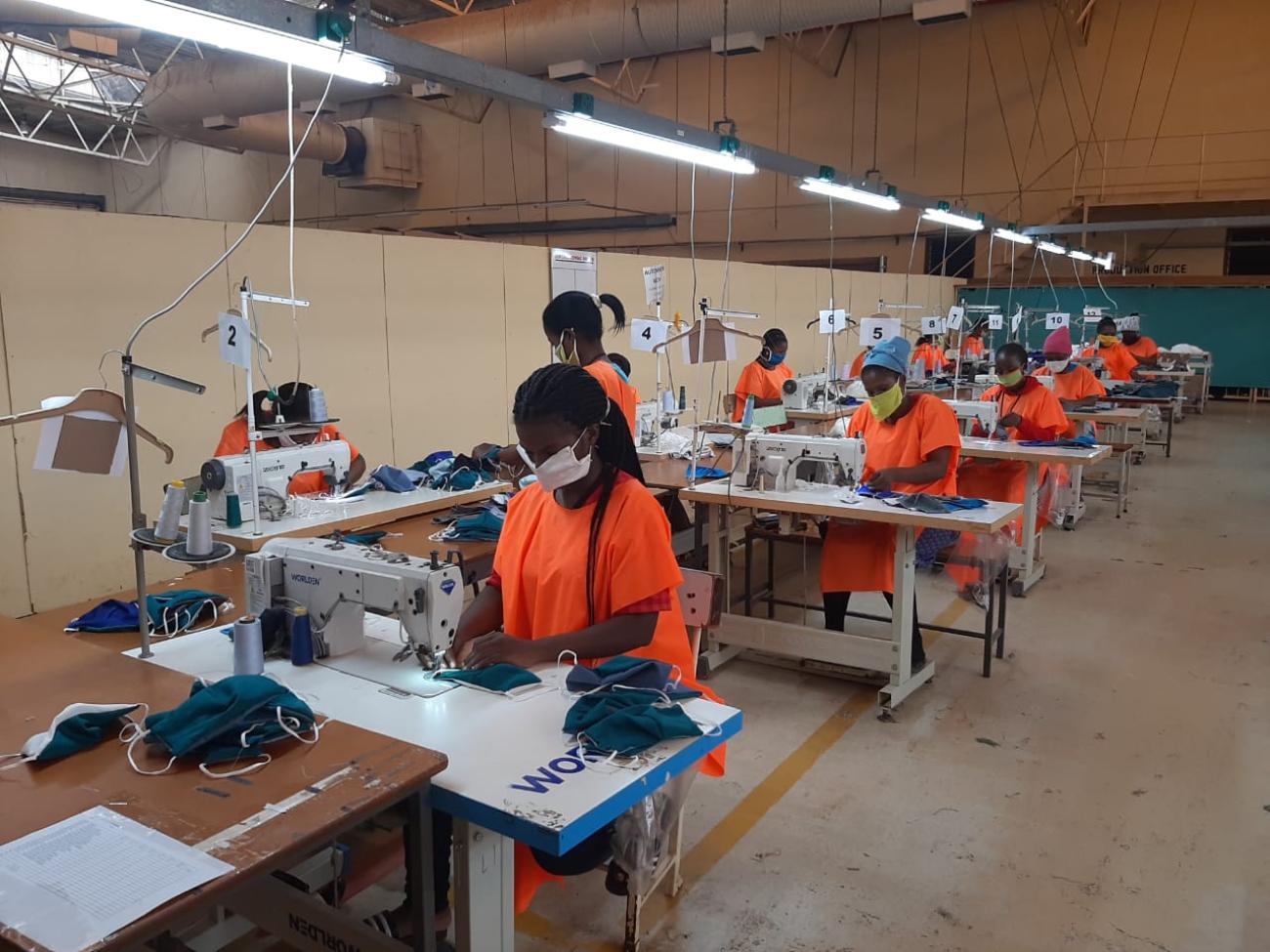Textile Company Changes Production to COVID-19 Protective Gears

Far East Textiles in Matsapha responds to COVID-19 by manufacturing Personal Protective Equipment (PPE) for Eswatini.
Since the World Health Organisation (WHO) declared coronavirus a public health threat of international concern, several companies have responded swiftly to mitigate COVI-19 socio-economic impacts and contribute with innovative solutions to the health emergency.
In Eswatini, the Textile industry is the second largest employer after the sugar industry. There are 20 textile companies in total that employ about 22 000 people, more than 80% of them being females aged 18 -55 years.
Textiles and sugar-related processing contribute a total 38% of Eswatini’s Gross Domestic Product (GDP) of which 7.6% is from manufacturing of Textile. The Textile Industry has two types of manufacturing, namely, Cut, Make and Trim (CMT) and Fully factored (FOB).
Far East Textiles, a company employing close to 700 (mostly) female workers from all regions and all walks of life, took immediate actions to prevent the spread of COVID-19 among its employees. The number of employees was reduced to 50 at a time in the factory. “Our first step was to educate our employees about COVID-19 in an effort to minimize risk exposures,” says Mrs. Tokky Hou, Managing Director of the company. “This is because we understood the need for some proper education since there is a lot misinformation circulating around.”
Far East Textiles mitigated risk exposure to its employees by setting up seven (7) sanitation stations in the 3000 square-metre factory, including inside toilets. While the company remains operational and compliant with Government’s measures during the COVID-19 pandemic not only by taking the necessary precautions to reduce risk exposure but also, with support from the United Nations Eswatini, by engaging in consultationswith the Ministry of Health to start manufacturing COVID-19 personal protective equipment.
“We are using a limited number of staff to produce the materials in a very controlled environment,” says Mrs.Hou. “We have the capacity to produce 3000 masks per day which means we can produce 60,000 per month and 10,000 gowns per month.”Mrs. Hou stated that the company had initiated the production of PPEs to address not just the needs of the country but also for their employees who cannot afford them because of their low incomes.
Far East Textiles also empowers women in rural communities to use waste from the factory to produce ordinary protective (not medical) face masks in their communities. At the commemoration of the International Women’s Day held on 9 March in Mafutseni, through the Minister of Education, Hon. Lady Howard-Mabuza, who is also a Member of Parliament for Mafutseni., Mrs. Hou donated 3 sewing machines to the Mafutseni community. The sewing machines will be used by women in Mafutseni to start production with the support of the company.
As of 12 April, Eswatini had 14 COVID-19 confirmed cases with 7 cases reported to have fully recovered. Since the beginning of the crisis, the Kingdom of Eswatini - with technical support from the United Nations and a wide range of partners - has been working very proactively to ensure preparedness and a rapid response to the global pandemic.
The Government has set up Public Health Emergency Management Committees at national and regional levels tasked, among other responsibilities to map out capacities and gaps to prevent the spread of COVID-19.
A Resource Mobilization Committee was set up by His Majesty King Mswati III and has set a target to raise E300 million to be used in improving health/medical facilities and ensuring the provision of medical and pharmaceutical supplies, including laboratory and testing facilities. A total of E79 Million have been raised so far from the private sector and development partners such as Taiwan and the UN.
On 9 April, the UN Eswatini presented to the Resource Mobilization Committee a One UN consolidated offer of support amounting to approximately USD 2,451,200 (E44,905,739). “It is with utmost humility and profound solidarity that I present the consolidated contribution of the UN Development System to the Government and the people of Eswatini at such a difficult time when we are confronted with the most challenging crisis the world has ever faced since the Second World War”, said UN Resident Coordinator, Ms. Nathalie Ndongo-Seh. “This offer has been made possible through resource mobilization efforts and the reprogramming of funds, programmes, interventions, activities and other commitments with various line ministries. This amount will cover primarily coordination, prevention and risk communication, technical assistance, the procurement of essential medical and pharmaceutical supplies and equipment, along with nutrition and the distribution of food items, she added.
The textile industry has not been spared from the socio-economic effects of COVID-19 as manufacturing has stalled in most factories due to the lockdown measures. “It is a tough call for us as we battle to stay afloat,” says Mrs. Hou. “We are doing everything we can to continue with production while ensuring compliance with precautionary measures to avoid the spread of COVID-19. As a company, we know that a complete shutdown will result in job losses and the company may not be able to continue with operations after the lockdown.”
As of the 1st of April 2020, the Government had revised GDP estimates for 2020 to address the effects of the COVID-19 pandemic on the economy and they are expected to publish be publishing new estimates soon.
For more photographs of Far East Textiles, please see: https://eswatini.un.org/en/41043-textile-company-changes-production-covid-19-protective-gears











